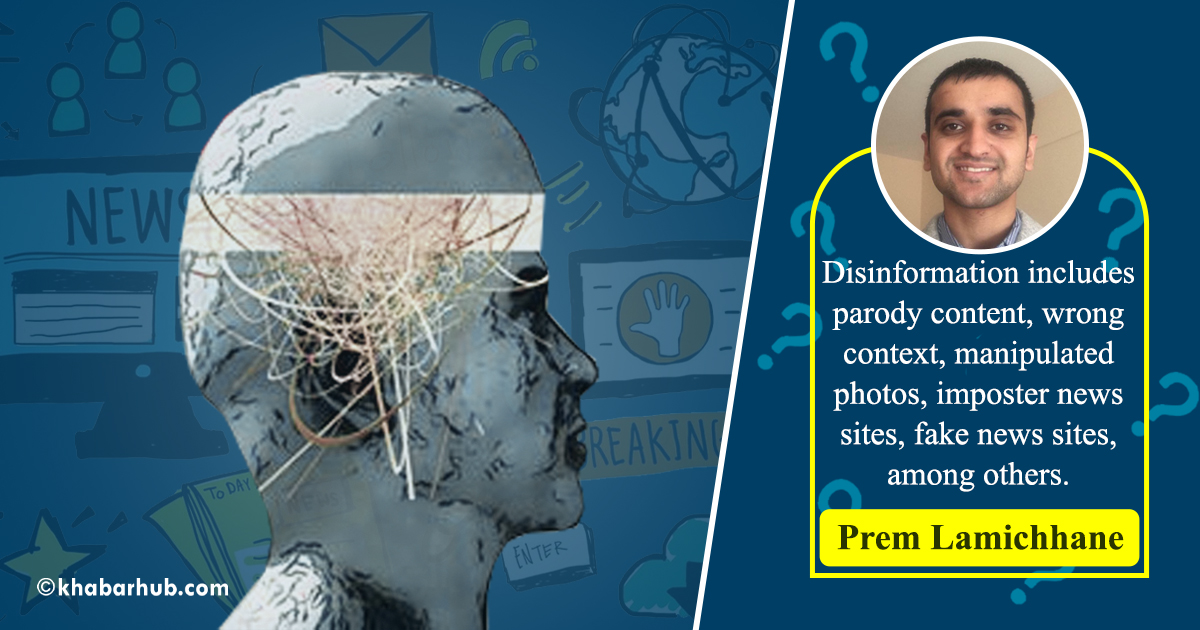Disinformation is false information that is used to influence public opinion or obscure the truth. The issues such as deep-fakes, misinformation and disinformation is rapidly increasing around the world, including in Nepal with the emergence of coronavirus.
Disinformation during times of a health crisis like COVID-19 pandemic can spread paranoia, fear and stigmatization. It can lead to the lives of many being put at risk. It is also a great threat to human rights and democracy. Hence, a battle against disinformation is global.
About half of the world is directly influenced or has experienced disinformation spreading from rapidly growing online platforms on a massive scale.
From the end of World War II to the year 2000 alone, scholars have documented some 116 attempts to influence elections – 80 of them by the United States. In the 80s, 90s, and 2000s, we witnessed lies and fake news about HIV Aids with the belief that HIV was created by a government laboratory that could be treated with goat’s milk.
Disinformation is growing in Nepal increasing the violence of online platforms such as Facebook especially targeting the corona infected and suspended people in addition to misinformation about what caused the outbreak to how you can prevent becoming ill. It has impacted directly on our human interaction and behavior.
Russia, meanwhile, has one of the longest histories of using disinformation campaigns affecting the internal politics of eight African nations. In 2019 alone, Russia used Facebook to intervene in the internal politics of eight African nations. Russian interfered in 27 elections around the world, from 1991 to 2017, including the 2016 U.S. elections.
Currently, we are experiencing a fresh inundation of fake news at this time of COVID-19 pandemic. From social sites like Facebook and WhatsApp, frequently shared misinformation includes everything from what caused the outbreak to how you can prevent becoming ill with the misinformation around how warm weather and drinking alcohol can affect the coronavirus.
A few weeks back, we read a news article from Iran that many people died from drinking industrial-strength alcohol, based on a false claim that it could protect them from COVID-19.
One poll by YouGov and the Economist in March 2020 found 13% of Americans believed the COVID-19 crisis was a hoax.
COVID-19 has been spread to more than 190 countries, and as more and more people are forced to stay at home quarantine, internet usage is much higher than usual. As people seek news and information online, working remotely, communicating with family, the number of internet users have grown up.
This directly promotes disinformation leading to a devastating effect. Several people have been arrested in countries such as India, Kenya, Palestine, Morocco for spreading disinformation about COVID-19 including Nepal.
A fake audio message mentioning the coronavirus case at Norvic Hospital went viral in Nepal which grabbed public attention very fast, who was later arrested by the Nepal police.
Unlike many countries, disinformation is growing in Nepal increasing the violence of online platforms such as Facebook especially targeting the corona infected and suspended people in addition to misinformation about what caused the outbreak to how you can prevent becoming ill. It has impacted directly on our human interaction and behavior.
The news and information on COVID-19 are overwhelming in online platforms. As it is difficult to get newspapers in hand at present due to lockdown, a large number of people rely on online platforms to get and share information.
There are different factors that disinformation can appear in. These include parody content, authentic material used in the wrong context, fake information, manipulated photos, videos, or audio, imposter news sites, fake news sites, and many more.
As digital platforms have been widely used to promote disinformation without fact-checking or sources. Such news easily catches the emotion of people and even smart people have fallen for lies spread about COVID-19.
Due to this, the WHO has called it the first social network pandemic ‘infodemic’ because of the disinformation and propaganda spreading on COVID-19 across the world.
It is also essential to know why such information is created. The major reasons are financial gain, political gain, and ideological purposes. And, they are amplified through fake social media accounts.
Hence, every country needs to make sure that people are safe by giving them accurate information about the pandemic like coronavirus (COVID-19).
How can you protect?
Never trust any news or information shared on an online platform without ascertaining the source and origin of the message. If you are not sure of the authenticity and correctness of its content, always check if that information is from a reliable source before sharing it on an online platform or forwarding it to others.
In case of any claims made in the message, one has received, always conduct secondary checks on google or other sites before disseminating it to others.
If the content incites strong emotions, it is likely to be sent for such purposes. And, the shocking or outrageous claims made need to be clearly verified before it is sent to others who may believe it completely. We must be really vigilant about change in human behavior when it comes to the flow of information.
Hence, It is important to check the facts and find a reliable source. We should always think about what our shared message could impact another person with such messages.
In the case of messages containing photos, audios, or videos, there is a possibility of them being edited to mislead people. We can always use fact-checking and authentication tools available online.
Sometimes there would be spelling, punctuation, or other grammatical mistakes that can point out the inauthenticity of the message.
The government can also mobilize the media to disseminate accurate information and facts to the public in order to control the dissemination of false information.
One needs to develop a healthy skepticism towards content shared on social media. We need laws and mechanisms in place against the law to spread such false information. Any harm resulting from such forwarding can make the person doing so liable to legal consequences.
Online platforms like WHO Information Network for Epidemics, COVID-19 Nepal and Nepal Corona Information are some of the reliable fact-checking sites that help people to verify claims made on social sites or messages which have gone viral relating to COVID-19 Nepal.
We can also use a search system such as Google to double-check such information. Until then, never share or forward any information available online.
We should always use media responsibly. As social media should not be a medium to share false messages and information. For instance, news article titles can be edited without getting attention and clicks. We should be extra careful before sharing information through online platforms or forwarding to others.
Being a social media use and technology literate, we must learn to identify the truth of all the information spreading around us. The government can also mobilize the media to disseminate accurate information and facts to the public in order to control the dissemination of false information.
Companies like Facebook, Twitter and WhatsApp are trying to control the disinformation about COVID-19. We too contribute to it on our side by reporting such incorrect information shared on social media. We should always be responsible and accountable to the actions we perform on social media.
The government and states have to remain more vigilant in the online and virtual world to protect individuals and society from the lurking dangers of an info-demic.
These measures can go a long way to fight against disinformation being spread about the COVID-19.
In order to combat the spread of the epidemic, different nations have taken precautionary measures such as social distancing, quarantine, lockdown and curfews. In addition, Nepal should have a clear act, government position and strict implementation mechanism to punish false content and people associated with it.
The recent launching of ‘Hamro Swasthya’, a mobile application developed by the Ministry of Health and Population, Government of Nepal to provide reliable information on important health to Nepali citizens is one such appreciable move.
UNICEF in coordination with the World Health Organization and the Government of Nepal has created an online platform to check misinformation and report them to safeguard people with accurate information about the coronavirus (COVID-19).
Similarly, the Accountability Lab Nepal has launched the Coronavirus CivActs Campaign (CCC) to gather rumors, concerns and questions from communities across the country to eliminate information gaps between the government, media, NGOs, and citizens by providing the public with facts and valid information on COVID-19.
Disinformation at this time of epidemic will have devastating effects on human beings. During the time when large numbers of humans are taking precautionary measures such as social distancing, quarantine, lockdown and curfews, the intensity and frequency of online communications are bound to surge, and so does the disinformation relating to COVID-19.
The government and states have to remain more vigilant in the online and virtual world to protect individuals and society from the lurking dangers of an info-demic.
Civil society and media outlets and the press have an enhanced responsibility to aware and increase literacy about the menace of deepfakes, misinformation and disinformation during the Situations like the coronavirus pandemic.









Comment